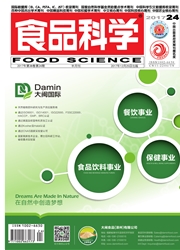

 中文摘要:
中文摘要:
为寻找降低淡水鱼致敏的有效方式,对鳜鱼致敏蛋白在酶解过程中抗原活性的变化情况进行研究。采用中性甲醛电位滴定法和间接酶联免疫吸附法测定木瓜蛋白酶水解鳜鱼蛋白后的水解度和抗原降低率。通过单因素试验和响应面分析研究酶解时间、酶用量、酶解温度、体系pH值以及各因素交互作用对水解度利抗原降低率的影响。模拟得到二次多项式回归方程的预测模型,并确定鳜鱼鱼肉蛋白最佳水解工艺条件:体系pH值为8.00的磷酸盐缓冲液,木瓜蛋白酶的酶用量为2940U/g,酶解时间4h,控制酶解温度为40℃。在此条件下,水解度和抗原降低率理论值为35.93%和56.78%,实测值为36.67%和58.33%。理论值和实测值之间相差较小,模型优化合适。
 英文摘要:
英文摘要:
In order to obtain an effective method for reducing the allergy of freshwater fish, the effect of enzymatic hydrolysis on antigen activity of mandarin fish protein was investigated. Neutral formaldehyde titration and indirect enzyme- linked immunosorbent assay were correspondingly used to detect the degree of hydrolysis (DH) and antigen activity of allergic protein from mandarin fish. Single factor analysis and response surface methodology were employed to analyze the effects of hydrolysis time, enzyme/substrate ratio, reaction temperature and pH as well as their interactions on DH and antigen activity. A mathematical regression model was established, and the optimal hydrolysis conditions were determined as hydrolysis pH of 8.00, enzyme/substrate ratio of 2940 U/g, reaction temperature of 40℃ and reaction time of 4 h. Under these conditions, the theoretical DH and reduction rate of antigen activity were 35.93% and 56.78%, respectively, very close to 36.67% and 58.33% of the actual results.
 同期刊论文项目
同期刊论文项目
 同项目期刊论文
同项目期刊论文
 Characterization of Allergens Isolated from the Freshwater Fish Blunt Snout Bream (Megalobrama ambly
Characterization of Allergens Isolated from the Freshwater Fish Blunt Snout Bream (Megalobrama ambly High-pressure treatment with silver carp (Hypophthalmichthys molitrix) protein and its allergic anal
High-pressure treatment with silver carp (Hypophthalmichthys molitrix) protein and its allergic anal 期刊信息
期刊信息
